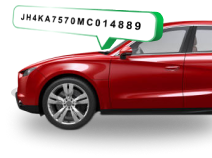Nevada VIN Check


How to Perform a VIN Lookup in Nevada?
VIN lookups are extremely helpful for gathering information on used cars and making an informed decision when purchasing these kinds of vehicles. These VIN checks allow you to learn more about the vehicle’s history and get details on title issues, past accidents, structural and mechanical damage, recalls, and other related information. You can perform a VIN lookup in Nevada using platforms like GoodCar, an approved NMVTIS data provider that allows you to generate comprehensive and reliable vehicle history reports.
Why Should I Run a nv VIN Check?

Running a VIN check in Nevada is a smart move for any potential car buyer. These checks provide valuable insights into a vehicle's status and provide access to a trove of information (on the vehicle), such as:
Nevada’s Lemon Law, as outlined in the Nevada Revised Statutes 597.600 - 597.688, is implemented to protect individuals who buy or lease vehicles in the state. The law primarily applies to new vehicles, demonstrator vehicles (driven by dealership employees but unsold), and used cars still covered by the original manufacturer’s warranty. However, motorhomes, living portions of RVs, off-road vehicles, and vehicles weighing more than 10,000 pounds are not covered by this law.
The Nevada Lemon Law protects eligible vehicles for one year or the duration of the manufacturer’s warranty, whichever is shorter. It stipulates that a manufacturer must replace or refund the price of defective vehicles (known as “lemons”) under the following certain conditions:
- It has a substantial defect covered by the warranty within the first year or warranty period. This defect must not have been caused by abuse, neglect, or unauthorized modifications and must significantly impair the vehicle’s use, value, or safety.
- The manufacturer, its agents, or authorized dealers fail to repair the defect after four attempts.
- It is out of service for 30 cumulative days due to the defect.
You must first report the defect to the auto manufacturer or an authorized dealer and allow them a reasonable number of attempts to fix it before requesting a refund or replacement. Be aware that claims under the Nevada Lemon Law must be filed within 18 months of the vehicle’s delivery.
VIN lookups relate to Nevada’s Lemon Law in that they can be used to check a vehicle's recorded defects and repairs. You can generate a comprehensive vehicle history report through a VIN check that can subsequently be used to determine if it meets the lemon law criteria or has been previously classified as a “lemon.” This information is crucial in helping buyers avoid potential headaches and costly repairs.
Why Choose GoodCar for Nevada VIN Lookup?
Requesters can benefit from extensive vehicle records and reports as they obtain information from accredited data providers like the NMVTIS. GoodCar also illustrates theft checks, collision records, recalls, flood, hail, or fire damage, and pricing.
Nevada Resources
-
Who Issues a Vehicle's VIN Number in Nevada?
Vehicle manufacturers assign Vehicle Identification Numbers (VINs) during production. However, state-assigned VINs may be issued for off-road vehicles and specially constructed trailers.
-
How Do I Verify a VIN Number in Nevada?
You can verify VINs in Nevada in person at a DMV inspection station, through law enforcement agencies, or online using approved third-party data providers like GoodCar.
-
Is It Safe to Check a Nevada VIN Online?
Yes, it’s safe to check a Nevada VIN online. However, it is advisable to use reputable data providers like GoodCar to perform these VIN checks.
-
Do I Need a VIN Inspection in Nevada?
Yes, a VIN inspection is required for any vehicle that has never been titled or registered in Nevada.
-
Are Nevada VIN Checks Necessary for Out-of-State Vehicles Brought into Nevada?
If you are a new resident or purchased an out-of-state vehicle, a VIN verification must be done before your vehicle can be registered in Nevada.
-
What Does a Nevada VIN Check Reveal?
Nevada VIN checks provide information on a vehicle’s history, title status, sales history, accident records, theft checks, recalls, and other related details crucial for performing due diligence on vehicles before purchasing.
-
Can You Ask for the VIN from a Nevada Seller?
Yes, you can ask a Nevada seller for the VIN when buying a vehicle. It’s essential for verifying the vehicle’s history and legal status. You should consider it a red flag if the seller hesitates to provide the VIN or discourages you from checking it.







